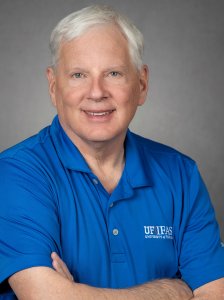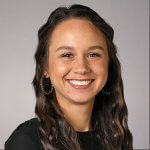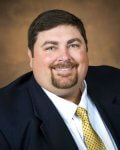January FloridAgriculture eNewsletter
 By J. Scott Angle
By J. Scott Angle
[email protected]
@IFAS_VP
The future of Florida farming depends on turning data into decisions and getting you credit for environmental stewardship.
UF/IFAS will help you achieve the first part by developing agricultural applications for artificial intelligence (AI)—think smart sprayers, counting tree canopies through aerial imaging, and phone apps that detect disease invisible to the human eye.
The second is incentivizing you to continue or even increase the amount of public goods you deliver but for which you do not presently get paid—think wildlife habitat, water storage, and carbon sequestration. We call these ecosystems services (ES).
Neither you in the field nor us in the lab can get there alone. So I recently went looking for those with the highest stake in that future—the young.
I found them through you, the Florida Farm Bureau Federation, and FFBF’s Young Farmers & Ranchers (YF&R). Actually, our own young ag leader, Christopher Hodge, UF/IFAS assistant director of governmental affairs, found them.
When we spent a day at the UF/IFAS Citrus Research and Education Center in Lake Alfred, they not only showed interest in learning more about AI and ES, they wanted to know how to integrate them into Florida farming faster.
They challenged me with angles I hadn’t fully considered. Lake County Farm Bureau board member Ryan Atwood urged Extension to provide guidance for the software purchasing decisions farmers will have to make, similar to how those agents currently provide advice on pesticides.
Highlan ds County YF&R Vice Chair Mikayla Allison asked me how I was going to address incentivizing increased carbon sequestration on land where the soil has already reached a carbon saturation point. I have to confess, even as a soil scientist, that it had not been on my mind.
ds County YF&R Vice Chair Mikayla Allison asked me how I was going to address incentivizing increased carbon sequestration on land where the soil has already reached a carbon saturation point. I have to confess, even as a soil scientist, that it had not been on my mind.
Former state YF&R leadership group memb er and Okeechobee County Farm Bureau vice president and dairyman Ben Butler urged me not to forget animal agriculture in developing AI technologies. He also asked that UF/IFAS to step up the integration of AI and ES by using technology to capture more nutrients before they leave the farm—and to show a public skeptical of agriculture’s environmental stewardship that farmers and scientists are hard at work on this.
er and Okeechobee County Farm Bureau vice president and dairyman Ben Butler urged me not to forget animal agriculture in developing AI technologies. He also asked that UF/IFAS to step up the integration of AI and ES by using technology to capture more nutrients before they leave the farm—and to show a public skeptical of agriculture’s environmental stewardship that farmers and scientists are hard at work on this.
UF/IFAS and FFBF will work together effectively toward this future together because we’ve already worked together effectively to develop the future leaders that were around the table that day in Lake Alfred.
Atwood is a double Gator, a former UF/IFAS Extension agent and a Wedgworth Leadership Institute graduate. Allison is a current student in the UF/IFAS College of Agricultural and Life Sciences pursuing a master’s degree online in the evenings while she works during the day for an agricultural software company. Butler is a double Gator as well as a graduate of Wedgworth.
These young ag leaders urged UF/IFAS to get Florida farming to its future faster and to do it in discussion with them. I can’t guarantee how fast the transformation of Florida agriculture will occur, but UF/IFAS will continue to rely on the insights of these young ag leaders to get there.
Scott Angle is the University of Florida’s Senior Vice President for Agriculture and Natural Resources and leader of the UF Institute of Food and Agricultural Sciences (UF/IFAS).
